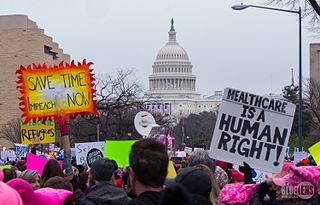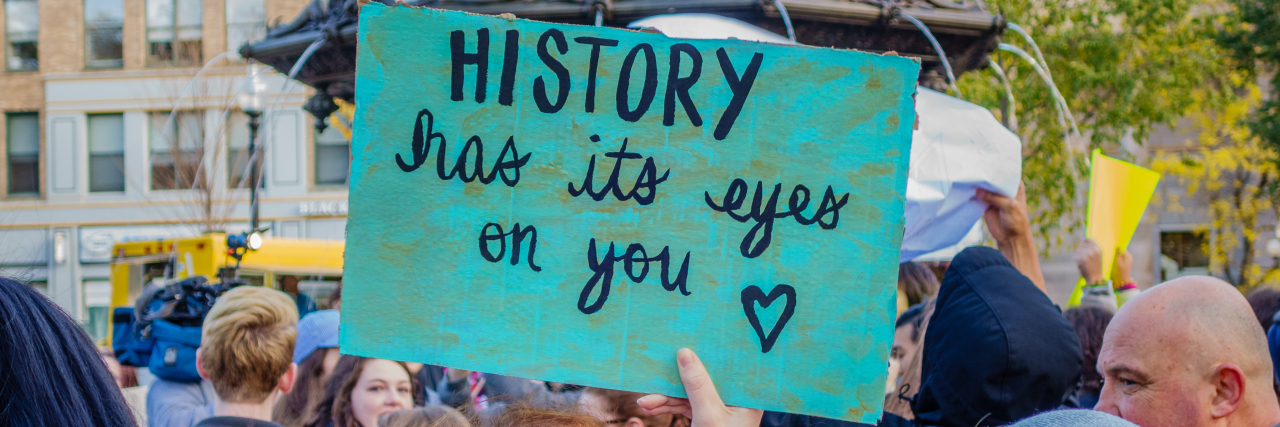Part I
I do not want to be around healthy people.
This was the first thought that came to mind when I was asked to join a group at a bar. These were not particularly close friends; in fact I would have only known one or two people. I thought about how the conversation would go and it was not one I wanted to have. I did not want to see others around my age with lives and priorities so far from my own, at least not that night. This instance made me realize the isolation I felt as a sick person among my peers. I allowed that isolation to radiate out, and recognized with stark clarity the degree to which sick and disabled people exist as one of the least visible groups.
This came on the heels of two similar instances. One being a friend filling up their social media feed with posts and images by and about sick and disabled people, and stating it made them feel more positive, more accepted and more confident. Soon after, at the memorial service of a friend’s friend who had had muscular dystrophy, it was said that “it must take a lot to tolerate the abled.”
These three instances struck such a chord within me about the unacknowledged isolation of sick and disabled people within a world of healthy, able-bodied people. I found myself devastated at the idea of how invisible, yet prevalent we are; how unsupported we are by the world around us. And how people forget that we are living disabled in an able-bodied world.
The recent documentary “Unrest” opens with Jennifer Brea’s husband saying that “one has to be careful. If you say too little they can’t help you, and if you say too much they think you’re a kind of mental patient.” I felt this statement made a profound point about the power structure that exists in regards to health. It exposes the ways those without the privilege of health are constantly recalibrating how to navigate that power structure. There is a conscious and constant performance of health we put on while in the world. And I imagine this performativity of self translates for most people in the disadvantaged position of systemic hierarchies, whether it be race, gender, sexuality, etc. If not for actual physical safety, then for emotional security, for a sense of belonging.
And while I don’t think it is as simple as a single factor, I do think it is as simple as the fact that people feel more comfortable around people like them. And this feels all the more pertinent in our current culture of increasing divisiveness. So while the last thing that I want to do is enforce bias or discrimination, I believe we need to acknowledge a feeling of comfort and community when one is with similar people, and how that is often neglected when it comes to sick and disabled people.
More and more I feel unable to join any space or conversation without bringing up the topic of my health. It does not come from a desire to monopolize the conversation or even that I constantly want to talk about it; it’s just increasingly impossible to engage in any topic without acknowledging how it has in some way been affected by my diagnosis. Politics, employment, dating, hobbies: there is no area it hasn’t affected. It is my life now.
While I am open about my cancer and proactively fill my life with other sick and disabled people, the majority of spaces I have to exist in are still mostly unable to acknowledge or be receptive to anything other than the default able body. But as a sick young adult in 2017, it is simply hard to engage with people unaffected by health concerns. I don’t feel as though I should have to defend that position. I believe in the radical possibilities of the sick body, and I am proud to inhabit that body and fight for its value and validity.
Part II
Now more than ever, the lack of awareness of ableism in our society is visible as a clear and present danger. Those of us not in the default position of health are currently at war for our lives. That is precisely why our societal invisibility is so deadly to us; the magnitude of our community remains unrecognized. The last census put the percentage of disabled Americans at 19 percent, and that’s not including dozens of illnesses. Yet somehow these numbers do not incite the radical empathy we desperately need at this crucial moment.
As of now, the Trump administration has specifically targeted sick and disabled people countless times with their repeated attempts to repeal the ACA, both directly and indirectly. As someone whose livelihood depends on healthcare, the fact that this continued assault isn’t recognized as ableism at its legal apex is an outrage. Now more than ever we need and beg for the help and solidarity of able-bodied people. We are under active attack. Please do not dismiss these attacks; they carry weight and history, and a long path of silence. As someone with PTSD and anxiety I hesitate to spread alarmism, but there are heady historical precedents here. With Nazis unabashedly walking our streets in 2017, I would remind people that the disabled and “incurably ill” were actively exterminated in WWII.
Our healthcare is our livelihood in ways most people can’t understand. The SaveOurCare protest in Los Angeles had so few people show up that I couldn’t help but be devastated. I fear it still isn’t registering with people just how insidious and monumental it is to take away our healthcare. The protest was dwarfed in size by the Women’s March and the travel ban protest, among other activist movements. And it’s not about about ego between causes, but I believe it is about empathy and support for each other during a time when so many people are under attack. Our strength lies in intersectionality and disability and illness is a part of that, despite our lack of visibility.

We need people to acknowledge us, and to acknowledge the lack of awareness regarding the systemic discrimination we face. However, since we have come so little distance in so long a time, and because it is now a matter of life and death, acknowledgement is no longer enough. We need a recognition of privilege, we need active solidarity, and we need continued vocal presence because visibility is the key to change.
I would also remind people to take a moment and reflect on the fact that at one point in their life they will most likely join our demographic. As Susan Sontag put it, “illness is the night-side of life, a more onerous citizenship… Although we all prefer to use only the good passport, sooner or later each of us is obliged, at least for a spell, to identify ourselves as citizens of that other place.”
The cruelty with which the GOP has repeatedly come after those of us who exist more permanently in this night-side is inhumane. Many of our lives already exist with higher levels of pain than the average person, and to move through the able-bodied world takes greater effort than most people realize. To repeatedly threaten these systems that simply keep us breathing is unconscionable.
As the Senate GOP tax bill now includes an attack on healthcare, please use this instance to fight for the lives of millions of Americans. Please, help us be a visible and vocal presence that this is not OK.
We want to hear your story. Become a Mighty contributor here.
Getty photo by HA Besen.

